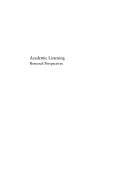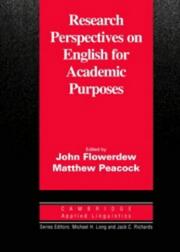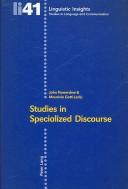| Listing 1 - 10 of 19 | << page >> |
Sort by
|

ISBN: 0521455448 0521455510 1139524615 9780521455510 9781139524612 9780521455442 Year: 1994 Publisher: Cambridge Cambridge University Press
Abstract | Keywords | Export | Availability | Bookmark
 Loading...
Loading...Choose an application
- Reference Manager
- EndNote
- RefWorks (Direct export to RefWorks)
A collection of original papers by researchers working in the field which comprehensively addresses the area of second language academic listening. This collection of original papers comprehensively addresses the area of second language academic listening. The papers are grouped under five broad headings. The first section provides an overview of research relevant to second language lecture comprehension. The second analyses aspects of the cognitive processes involved in listening comprehension. In the third section, the object of the comprehension process is examined, and in the fourth, ethnographic approaches are explored by extending the concept of listening comprehension to place it in the wider context of 'the culture of learning'. In the final section, the theory of second language listening comprehension is related to practical pedagogic concerns. Each section is preceded by an accessible introduction and the book as a whole provides detailed coverage of important aspects of academic listening phenomena.
Comprehension. --- Lecture method in teaching. --- Listening. --- --Compréhension orale --- Méthode --- --Listening --- Lecture method in teaching --- 453 --- #KVHA:Notitietechnieken; tolken --- #KVHA:Luistervaardigheid; Engels --- Didactics of higher education --- Didactics of languages --- Langues --- --Enseignement --- Comprehension --- Listening --- Auding --- Attention --- Educational psychology --- Hearing --- Lectures and lecturing --- Teaching --- Understanding --- Apperception --- Learning, Psychology of --- Memory --- --Méthode --- Enseignement --- Compréhension orale

ISBN: 0582418879 9780582418875 Year: 2006 Publisher: Harlow, England ; New York : Longman,
Abstract | Keywords | Export | Availability | Bookmark
 Loading...
Loading...Choose an application
- Reference Manager
- EndNote
- RefWorks (Direct export to RefWorks)
Discourse analysis. --- Scholars --- Rhetoric. --- Language.
Book
ISBN: 0203080874 041549964X Year: 2012 Publisher: Hoboken Routledge
Abstract | Keywords | Export | Availability | Bookmark
 Loading...
Loading...Choose an application
- Reference Manager
- EndNote
- RefWorks (Direct export to RefWorks)
Book
ISBN: 9789027222473 9027222479 9786612104770 1282104772 9027289719 Year: 2009 Publisher: Amsterdam Benjamins
Abstract | Keywords | Export | Availability | Bookmark
 Loading...
Loading...Choose an application
- Reference Manager
- EndNote
- RefWorks (Direct export to RefWorks)
Cohesion is generally described with regard to two broad categories: 'grammatical cohesion' and 'lexical cohesion'. These categories reflect a view on language that treats grammar and lexis along separate lines. Language teaching textbooks on cohesion often follow this division. In contrast, a corpus theoretical approach to the description of English prioritises lexis and does not assume that lexical and grammatical phenomena can be clearly distinguished. Consequently, cohesion can be seen in a new light: cohesion is created by interlocking lexico-grammatical patterns and overlapping lexical items. A corpus theoretical approach to cohesion has important implications for English language teaching. The article looks at difficulties of teaching cohesion, shows links between communicative approaches to ELT and corpus linguistics, and suggests practical applications of corpus theoretical concepts.
Lexicology. Semantics --- Grammar --- Pragmatics --- 801.56 --- Syntaxis. Semantiek --- Cohesion (Linguistics) --- Discourse analysis. --- Lexical grammar. --- Lexical grammar --- Discourse analysis --- Philology & Linguistics --- Languages & Literatures --- 801.56 Syntaxis. Semantiek --- Cohesion (Linguistics). --- Generative grammar --- Grammar, Comparative and general --- Lexicology --- Discourse grammar --- Text grammar --- Semantics --- Semiotics --- Coherence (Linguistics) --- Cohesiveness (Linguistics) --- Linguistics
Book
ISBN: 9781623563059 1623563054 1474269788 1474295347 1623563011 162356235X Year: 2014 Volume: 3 Publisher: Bloomsbury Publishing
Abstract | Keywords | Export | Availability | Bookmark
 Loading...
Loading...Choose an application
- Reference Manager
- EndNote
- RefWorks (Direct export to RefWorks)
Context (Linguistics). --- Discourse analysis. --- Context (Linguistics) --- Discourse analysis

ISBN: 052180518X 0521801303 9780521801300 9780521805186 9781139524766 1139524763 Year: 2001 Publisher: Cambridge Cambridge University Press
Abstract | Keywords | Export | Availability | Bookmark
 Loading...
Loading...Choose an application
- Reference Manager
- EndNote
- RefWorks (Direct export to RefWorks)
The number of non-native students studying in English-medium universities has increased over the past decade. Paralleling this growth is the interest in English for Academic Purposes (EAP). No one research-based volume has yet investigated the theoretical issues and pedagogical concerns of the area. This wide-ranging volume of specially commissioned articles from leading scholars in the field aims to bring to the wider community current research in the field and its implications for pedagogy. It offers a state-of-the-art representation of research in EAP and will help define the field in the coming years.
#KVHA:Linguistiek; Engels --- Didactics of English --- English language --- Study and teaching --- Foreign speakers. --- Academisch Engels --- Engelse taal --- English for academic purposes (EAP) --- didactiek. --- Didactiek. --- Germanic languages --- English language - Study and teaching - Foreign speakers.

ISBN: 0521786479 0521781353 0511667248 9780521786478 9780511667244 9780521781350 Year: 2013 Publisher: Cambridge Cambridge University Press
Abstract | Keywords | Export | Availability | Bookmark
 Loading...
Loading...Choose an application
- Reference Manager
- EndNote
- RefWorks (Direct export to RefWorks)
This book combines up-to-date listening theory with case studies of actual pedagogical practice. The paperback edition combines up-to-date listening theory with case studies of actual pedagogical practice. As an essential part of communicative competence, listening is a skill, which deserves equal treatment with the other basic skills of speaking, reading, and writing. The authors describe current models of listening theory and exemplify each with a textbook task. They address the role of technology in teaching listening, questioning techniques, and testing. This text is designed for use with both pre-service and in-service teachers who are involved in the teaching of listening or the design of pedagogic materials for listening.
Second language acquisition. --- Language and languages --- English language --- Oral communication --- Langue seconde --- Langage et langues --- Anglais (Langue) --- Communication orale --- Study and teaching. --- Study and teaching --- Foreign speakers. --- Acquisition --- Etude et enseignement --- Allophones --- Listening --- Auding --- Attention --- Comprehension --- Educational psychology --- Hearing --- Language and languages Study and teaching --- Language and education --- Language schools --- Language and languages - Study and teaching --- Oral communication - Study and teaching

Abstract | Keywords | Export | Availability | Bookmark
 Loading...
Loading...Choose an application
- Reference Manager
- EndNote
- RefWorks (Direct export to RefWorks)
Sublanguage --- #KVHA:Academische taal --- #KVHA:Gerechtstaal --- #KVHA:Institutionele taal --- #KVHA:Wetenschappelijke taal --- #KVHA:Zakelijke taal --- Language for special purposes --- Restricted language --- Special language --- Discourse analysis --- Language and languages --- Semantics --- Register (Linguistics) --- Variation
Book
ISBN: 9780367330583 9780367330590 9780429317798 9781000459050 9781000459012 Year: 2022 Publisher: London Routledge, Taylor & Francis Group
Abstract | Keywords | Export | Availability | Bookmark
 Loading...
Loading...Choose an application
- Reference Manager
- EndNote
- RefWorks (Direct export to RefWorks)
"There has been growing scholarly research and interest in writing for academic publication over the past decade and the field of English for Research Publication Purposes (ERPP) has established itself as an important domain within English for Academic Purposes (EAP). This introductory volume provides a comprehensive view of what ERPP encompasses as a scholarly field, including its disciplinary boundaries, competing discourses within the field, research and practice paradigms, and future prospects for research and pedagogy in this field. The book portrays a multifaceted and nuanced picture of the discourses and discussions shaping and underlying ERPP as a scholarly field, focusing on key aspects of ERPP including: emergence and expansion of ERPP; key theoretical and methodological orientations framing ERPP research; writing for scholarly publication practices of EAL, Anglophone, and early-career scholars and graduate students; the pedagogy of ERPP and relevant international policies, practices, and initiatives; the advancement of digital technologies and the implications for ERPP; new directions in ERPP practice and research. This book is essential reading for students and scholars within the areas of in Applied linguistics, TESOL, and English for Academic Purposes"--
Science --- Higher education --- Mass communications --- English language --- Academic writing --- Study and teaching (Higher) --- Foreign speakers. --- Rhetoric --- Learned writing --- Scholarly writing --- Authorship --- Foreign students --- Germanic languages
Book
ISBN: 1315518996 1315519011 1315519003 113890743X 1138907448 9781315519005 9781315519012 9781315518985 1315518988 9781315518992 9781138907447 9781138907430 Year: 2017 Publisher: London
Abstract | Keywords | Export | Availability | Bookmark
 Loading...
Loading...Choose an application
- Reference Manager
- EndNote
- RefWorks (Direct export to RefWorks)
Discipline-Specific Writing provides an introduction and guide to the teaching of this topic for students and trainee teachers. This book highlights the importance of discipline-specific writing as a critical area of competence for students, and covers both the theory and practice of teaching this crucial topic. With chapters from practitioners and researchers working across a wide range of contexts around the world, Discipline-Specific Writing: Explores teaching strategies in a variety of specific areas including science and technology, social science and business; Discusses curriculum development, course design and assessment, providing a framework for the reader; Analyses the teaching of language features including grammar and vocabulary for academic writing; Demonstrates the use of genre analysis, annotated bibliographies and corpora as tools for teaching; Provides practical suggestions for use in the classroom, questions for discussion and additional activities with each chapter. Discipline-Specific Writing is key reading for students taking courses in English for Specific Purposes, Applied Linguistics, TESOL, TEFL and CELTA.
| Listing 1 - 10 of 19 | << page >> |
Sort by
|

 Search
Search Feedback
Feedback About UniCat
About UniCat  Help
Help News
News